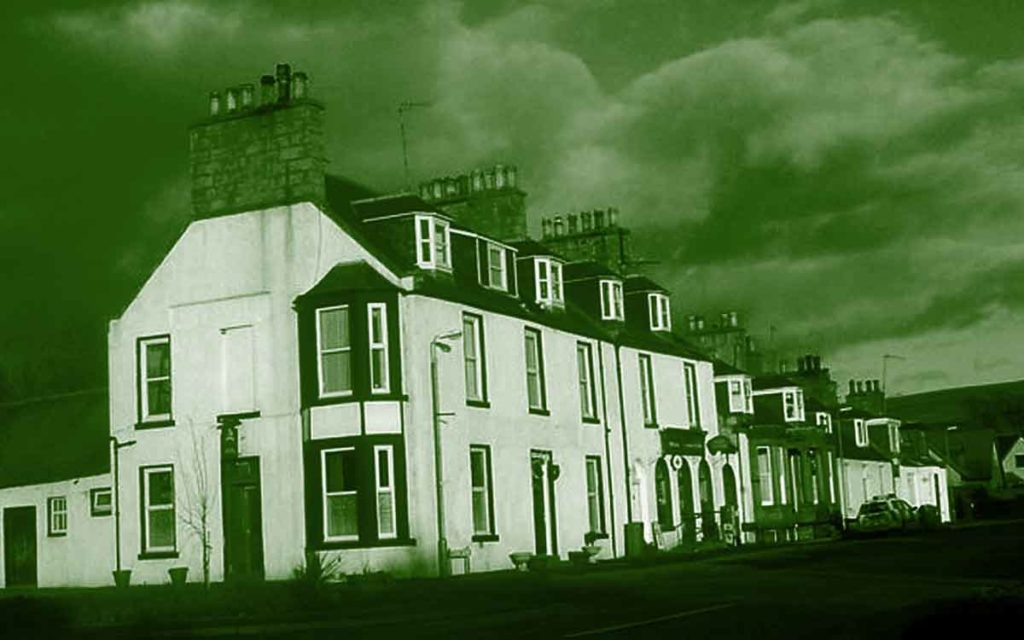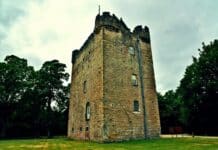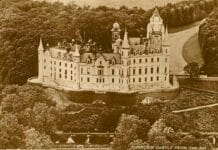Did Banquo’s ghost return to haunt Deeside of Lumphanan, asks guest writer DUNCAN HARLEY
A hand-puppet theatre group, The Scottish Sock Falcetto Theatre Company, made a mockery of the bloody murder of Macbeth during a comedy performance at the Edinburgh Festival some years ago.
Alongside comments such as “Double, double toil and trouble; Fire burn, and caldron bubble” they pointed out that any mention of the word Macbeth on stage would expose thespians to a lifetime of bad luck. In point of fact though, the play contains quite a large amount of swordplay, so injuries to actors are probably quite common.
Macbeth murdered at Lumphanan
The royal murder seemingly happened in the Deeside village of Lumphanan and of course the place boasts a strong claim to the legend since in a brutal act central to the Shakespearian tragedy, King Macbeth was mortally wounded – some say decapitated, at the hands of his nemesis Malcolm Canmore in a what must have been a bloody last stand on the outskirts of the tiny settlement.

Although both Shakespeare’s play and the Falcetto’s take on the Macbeth tale part company on details of geography and history, pseudo-historical sites near where Macbeth supposedly fell, such as Macbeth’s Stone and Macbeth’s Well, nowadays continue to attract large numbers of visitors each year eager to re-trace the story of the headless Scottish noble. Indeed, a pre-historic defensive structure, known locally as the Lumphanan Peel Ring, is reputed to be the actual location of the royal slaying. But, as with many such claims, written records are sparse and the Lumphanan Peel Macbeth claim may be simply a finely crafted but enduring myth.
Monster witnessed at Lumphanan?
In 1993, however, Lumphanan made the national news for a completely different reason when just two miles down the road at neighbouring Torphins three young men reported an encounter with a large, dark and very hairy figure which ran alongside their car as they drove into Aberdeen for a Friday night out.
The hairy creature seemingly stared intently at the youths, and ran alongside the vehicle for nearly five minutes at speeds of up to 50mph, before suddenly vanishing completely leaving the occupants without a rational explanation. At around the same time, a local woman living in a secluded Deeside cottage reported sighting a giant, hairy figure lurking in the forest just outside her front door.
There has never been a satisfactory explanation for the sightings although some proponents of the Lumphanan Peel murder theory wonder if Banquo’s Ghost had quite simply taken a wrong turning on his way to nearby Lumphanan.
Although unproven, there is a suspicion that Shakespeare may have actually visited the North-east in 1601. Seemingly a playgroup known as The King’s Servants played at Aberdeen in that year and legend has it that the bard’s signature appears, albeit two years later, on a Royal Licence granted by James VI which sent players from the Globe Theatre off on a Scottish Tour.
So, perhaps the bard who composed The Scottish Play had taken time out to gather some local knowledge about the murder of Macbeth. It makes a fine story. But, as always, who really knows for sure at this distance in time? As for Macbeth’s final resting place? Well, like Inverurie’s King Eth of the Swift-foot (see my previous Spooky article: The Evil Earth Magnetism of the Bass of Inverurie), he is also reputed to be interred amongst a host of other Scottish kings on the west coast island of Iona. Such a busy graveyard!
DUNCAN HARLEY is author of The A-Z of Curious Aberdeenshire and The Little History of Aberdeenshire, both titles are available from Amazon.







